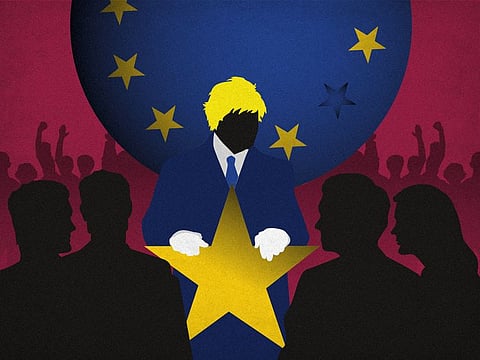UK and EU all set to kick off a trade war
Brexit tensions have resurfaced because UK’s deal to leave the bloc was half-baked

Brexit. I bet you thought it was done and dusted. Over. Finito.
Not a chance.
In the coming weeks, there’s every likelihood that the United Kingdom and the European Union will kick off a trade war.
And talk about timing. On Wednesday morning, Britian woke up to a report that inflation this year will be 9 per cent — the highest level in 40 years. It’s the biggest shock to Brits pockets since Edward Heath was in 10 Downing Street.
As well as costs associated with global supply chain issues following the coronavirus pandemic and the effects of the conflict currently underway in Ukraine, the British are also feeling the pinch from leaving the EU — and its 6 per cent hit on their gross domestic product.
With that triple whammy of inflationary pressures, the prospect of tariffs being placed on foodstuffs and products imported from the world’s third-largest market of 500 million consumers on their doorstep, is now very real.
Northern Ireland protocol
That Brexit deal that UK Prime Minister Boris Johnson said was “oven-ready” now is proving to be half-baked and very short indeed on raw substance. And yes, the historic election results in Northern Ireland where the nationalist party Sinn Fein won a majority of seats in the power-sharing parliament in Belfast, have exposed just how wrong Johnson was in agreeing to the so-called Northern Ireland protocol.
The issue with Brexit — from the time the idea was first floated by British imperialists who cared little for a free market of half a billion people, the free movement of goods and services, and the liberal values of the European Court of Justice and the European Parliament — is that it failed to understand the complexities of placing a trade border between the Republic of Ireland and British-ruled Northern Ireland on the divided island.
Of course, had the UK seen the sense in staying with the European Economic Area — the wider customs area that includes Norway, Lichtenstein and Iceland as well as the 28 then members of the EU — this mess could have been avoided. But now. Brexit meant Brexit, taking back control and all of that codswallop. And codswallop it was and is.
Theresa May tried to convince a majority of MPs at Westminster that her Brexit deal would mean keeping the UK and the EU broadly aligned when it comes to regulations and trade, solving the issue of the Irish border and keeping it open.
That deal, however, was scuppered time and time again by the Democratic Unionist party and its 10 MPs on which May relied for a majority, and by Boris and his hard-line cronies. Of course, Boris then simply wanted to replace May as PM too.
And when it became Boris’ turn to get Brexit done, he simply drew the customs border down the Irish Sea, leaving England Scotland and Wales outside the customs union, with Northern Ireland still following EU trade rules. That’s the NI protocol and that’s what’s causing all of the tensions now.
The DUP say they won’t join the power-sharing government with Sinn Fein until that protocol is scrapped, and if they stay out of the Belfast government, there’s every chance that political tensions might spill over into violence once more.
So right now, we are in the ludicrous position when the UK Government is planning legislation to ride roughshod over the protocol — effectively ignoring its international obligations and walking away from its legal commitments signed in the Brexit deal.
Is it any wonder many Conservatives are up in arms over the proposed legal move, saying that if Johnson goes ahead with it, no country can ever trust the UK again when it comes to living up to its legal and international obligations?
And the EU too are furious.
Fragile diplomatic relationship
The UK government argues the deal in its current form is causing friction to trade between Britain and Northern Ireland, and in turn threatening the 1998 peace agreement that mostly ended three decades of sectarian violence in the province.
Britain has previously argued it has grounds to trigger a clause in the deal allowing parts of the Brexit treaty to be abandoned — a move that could badly damage an already fragile diplomatic and economic relationship with the EU.
There is also the small issue that a majority in Northern Ireland voted in favour of remaining in the EU in the 2016 referendum that resulted in a national 52-48 per cent margin in favour of leaving the bloc.
Many of the checks on goods coming from Britain have not been implemented after London applied grace periods. Where changes have come into force, paperwork, costs and staffing needs have risen.
Britain says a “green lane” should be introduced for products destined for Northern Ireland, avoiding the full checks needed for the EU. Additional labelling would increase costs for producers however.
British retailer Marks & Spencer says it takes around eight hours to complete post-Brexit paperwork to move goods into its stores in the Republic of Ireland, and around an hour for Northern Ireland currently, due to the grace periods.
During the first year of the protocol trade between the Republic of Ireland and Northern Ireland jumped, with imports up 65 per cent and exports to the province 54 per cent higher, suggesting stronger ties between Northern Ireland and the Republic.
Under the new plans, legislation would ease the movement of goods, apply Britain’s tax regime in Northern Ireland and hand London more say over the laws governing the province.
Of course, this is all playing out while the EU is consumed with a full-blown war on its eastern borders between Russia and Ukraine. Brussels will have little patience now with London and its meddling with a deal the EU feels was signed, done and dusted. Trade tariffs, anyone?


